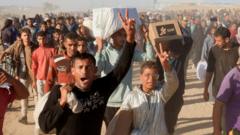In a significant joint statement, more than 130 charities and NGOs have called for the closure of the Gaza Humanitarian Foundation (GHF), which is backed by both the Israeli and US governments. The urgent plea follows a somber toll: over 500 Palestinians have been reported killed while seeking aid from the GHF since its inception in late May, after what was characterized as a three-month blockade by Israel on Gaza. The organizations, including prominent groups such as Oxfam, Save the Children, and Amnesty International, report that the situation has resulted in almost 4,000 injuries.
The coalition argues that Israeli forces and militant factions consistently fire upon Palestinians in need, contrary to Israel’s claims that its military does not deliberately target aid seekers. The Israeli government defends the GHF system, maintaining it ensures direct aid delivery bypassing Hamas’s control.
The organizations’ joint statement decries the foundation's operations, stating they violate fundamental humanitarian principles by forcing nearly two million people into heavily militarized zones where they are at constant risk of gunfire. Eyewitness accounts corroborate these claims, with reports from medical personnel and the Hamas-led health ministry detailing civilian casualties at GHF distribution sites.
The GHF replaced a network of 400 aid distribution centers that were previously operational during a ceasefire between Israel and Hamas, reducing access to just four military-controlled locations—three in Gaza's far southwestern region and one in central Gaza. The summation by the NGOs starkly outlines the dire situation for Gazans: “Today, Palestinians in Gaza face an impossible choice: starve or risk being shot while desperately seeking food.”
The situation has escalated to a grave humanitarian crisis, particularly affecting vulnerable populations such as orphaned children, who have sustained injuries in many reported incidents. The UN has spoken out against the GHF model, with Secretary-General Antonio Guterres labeling it as "inherently unsafe."
Despite the outcry, Israeli authorities have begun reviewing reports of civilian harm near GHF centers, although Prime Minister Benjamin Netanyahu has categorically dismissed claims that Israeli Defense Forces (IDF) are ordered to fire upon civilians. The IDF maintains that it is reorganizing access to GHF distribution sites to enhance safety, including the potential installation of fencing and warning signage.
As the GHF continues its operations amidst calls for change, over 130 aid organizations emphasize that the framework of providing assistance fails to meet humanitarian needs, arguing that families are now weaker and less capable of competing for dwindling food supplies in an environment marked by starvation and violence.
The coalition argues that Israeli forces and militant factions consistently fire upon Palestinians in need, contrary to Israel’s claims that its military does not deliberately target aid seekers. The Israeli government defends the GHF system, maintaining it ensures direct aid delivery bypassing Hamas’s control.
The organizations’ joint statement decries the foundation's operations, stating they violate fundamental humanitarian principles by forcing nearly two million people into heavily militarized zones where they are at constant risk of gunfire. Eyewitness accounts corroborate these claims, with reports from medical personnel and the Hamas-led health ministry detailing civilian casualties at GHF distribution sites.
The GHF replaced a network of 400 aid distribution centers that were previously operational during a ceasefire between Israel and Hamas, reducing access to just four military-controlled locations—three in Gaza's far southwestern region and one in central Gaza. The summation by the NGOs starkly outlines the dire situation for Gazans: “Today, Palestinians in Gaza face an impossible choice: starve or risk being shot while desperately seeking food.”
The situation has escalated to a grave humanitarian crisis, particularly affecting vulnerable populations such as orphaned children, who have sustained injuries in many reported incidents. The UN has spoken out against the GHF model, with Secretary-General Antonio Guterres labeling it as "inherently unsafe."
Despite the outcry, Israeli authorities have begun reviewing reports of civilian harm near GHF centers, although Prime Minister Benjamin Netanyahu has categorically dismissed claims that Israeli Defense Forces (IDF) are ordered to fire upon civilians. The IDF maintains that it is reorganizing access to GHF distribution sites to enhance safety, including the potential installation of fencing and warning signage.
As the GHF continues its operations amidst calls for change, over 130 aid organizations emphasize that the framework of providing assistance fails to meet humanitarian needs, arguing that families are now weaker and less capable of competing for dwindling food supplies in an environment marked by starvation and violence.


















